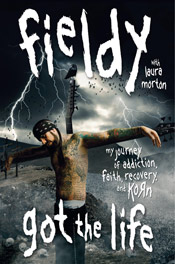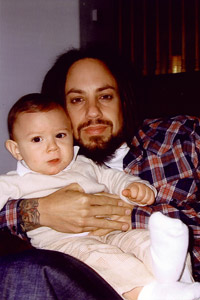As the bass player with Korn, Reginald Arvizu, Jr. – better known as Fieldy to his legions of fans – lived the life. With sales topping 30 million, the proverbial sex, drugs and rock ‘n’ roll were all in abundance.
As the band heads out on tour this month, he’s as ready as ever to rock. Offstage, however, he’s focused on entirely different pursuits than in the past.
Like reading his Bible, or writing a book of daily devotions.
 In the just released Got the Life: My Journey Of Addiction, Faith, Recovery, and Korn (William Morrow), Arvizu tells how he got from here to there. At times, it’s not a pretty story. Despite massive success, he would fight with his band mates, treat fans horribly, and repeatedly cheat through three successive marriages.
In the just released Got the Life: My Journey Of Addiction, Faith, Recovery, and Korn (William Morrow), Arvizu tells how he got from here to there. At times, it’s not a pretty story. Despite massive success, he would fight with his band mates, treat fans horribly, and repeatedly cheat through three successive marriages.
The book shares much with the standard rocker biographies – tales of sordid exploits in and out of Korn are plentiful – but it’s much more.
Arvizu taps into universal truths, and at its heart the book is about the human condition, and one man’s struggle to find love.
Maintaining that all personal darkness comes from having a broken heart, Arvizu says that for him, the first occurred during his teens, when his parents divorced. His father – a musician – was an alcoholic and often violent towards Fieldy’s mother.
Their dysfunctional relationship provided a blueprint he would follow for years to come. Drugs, alcohol, food and sex became crutches to fill the void.
“It’s crazy,” he acknowledges, “because you end up following your parents. People do. I didn’t really want to, it’s just – you end up doing it. Whether it’s the man following the dad, or the woman following the mom; the majority of people end up following their parents. Why do we do that? I don’t know – it’s kind of a mystery. I guess because we love them.”
Anger defined many of his relationships while growing up. More often than not, it was directed towards women, with little self-awareness as to why.
“Looking at it today, it was probably because I put up my wall. I didn’t want to be hurt, and I knew that that’s what it took; if I didn’t let any women in, I wouldn’t have to worry about getting hurt. Because the only thing that could hurt me, was a woman.”
Eventually, no one could get through. After the divorce, Reginald Arvizu, Sr. underwent a radical transformation, embracing Christianity and remarrying. Despite attempts to mend relations with his son, Fieldy remained skeptical.

“I guess I was probably to a point where I felt: I’m not gonna get hurt by love, period. By anyone. I hardened my heart – because it hurts when you get your heart broke.”
Discussing his feelings was not an option. “I didn’t know how to voice it. I didn’t want to sit and talk about things like that. That’s probably a lot of the reason why I stayed high all the time.”
He believes that’s typical of his generation. “I see that. People want to run – they don’t want to sit down and talk deep life. There’s very few people that can just talk about things.
“Even for myself today – I still find it hard if somebody tells me something I don’t want to hear, but I know it will make things better. I still feel myself get a little defensive, and I have to step back, and be like; ‘You know what, man? You’re right. That would be better.’ It’s just human nature.”
“Actually,” he reconsiders, “I don’t think it’s even human nature. It’s that roaring lion, looking for someone to devour. The enemy; the devil. He’s loose. If it wasn’t for him, we’d probably all be real, loving people. But he’s here.”
His father’s death was the catalyst for change. Four years ago, his dad was diagnosed with an aggressive form of cancer. Initially, Fieldy was in denial about the illness, believing he could remedy the situation via his own exalted position as a millionaire rock star.
He continued to party until the day of the funeral. That night, for the first time ever, he and his wife prayed with his stepmother.
At the time, he didn’t understand the ramifications, but a fundamental change had occurred. The following day – after 20 years of non-stop partying – he flushed his drugs down the toilet. That was it. Not rehab, no self-help groups.
For many, it takes a crisis to bring about substantial personal change. Arvizu agrees, but with a caveat; “I think that when a crisis comes in someone’s life, you do have a choice to make that turnaround. But when someone makes a turnaround without Christ, it doesn’t work.

“We all thirst to fill this emptiness inside, and we chase everything from money to women to drugs to alcohol. And there’s only one thing that can fill that emptiness, and that’s Christ Jesus. That’s it. And until people can realize that, they’re going to continue to try and fill that emptiness.”
In spite of his prolonged substance abuse, he’s adamant that neither rehab nor Alcoholics Anonymous could have helped him.
“It wouldn’t work, because I just can’t trust that whoever – the founder of rehab or whoever put this book out – they put a book out and said, ‘This is the way.’ Why is that person better than me? I could put a book out saying you can become sober. But when you become sober, are you going to have that peace? Is your heart going to be filled? If you look at the A.A. book, it’s thicker than a Bible! The Bible’s free, and some rehabs cost $30,000.”
Twelve Step-based programs such as Alcoholics Anonymous employ a language of inclusiveness, subscribing to the God of your understanding, or one’s ‘Higher Power.’
“I don’t really agree with that. The Bible says that nobody comes to God but through his son Jesus Christ. If there are some A.A.’s that are going through Christ, I’m fine with it. The ones I know, they only use ‘God.’ But because the Bible says that nobody comes to God but by Jesus Christ – if they’re not doing it that way, then I can’t agree with any of them.
He confesses to not understanding ex-addicts who struggle to stay clean.

“You know, I don’t. I ran into a guy yesterday at my book signing, and man, I wished I had time to talk to this guy. I wanted to – and next time I’m going to make some time – but I was signing, and there was a line. He walked up, and he’s like; ‘Man, I want to congratulate you. You’ve been sober, and I’ve been sober for five years – and man, every day is so hard.’ And I’m like ‘What?’ I want to go ‘Why?” I’m just curious to get in his head. I’ve been set free, and I don’t have those problems like that. I’ve been set free.
“I’ve never met someone that’s gone to rehab that has a sense of peace. Most of those people, I’ll hang out with them, and they’re so jittery – either smoking cigarettes or pounding coffees – that I want to go ‘Hey bro – can you hand me a beer? You make me want to drink.’ Because they’re so not at ease.”
We spoke on a couple of occasions for this feature, and returned each time to this subject – which is clearly close to his heart.
“It’s funny, because right before [the second interview], I prayed to have the right answer; ‘What do I say about this?’ I didn’t really know exactly what the question was, but I prayed, and I read my Bible.
“Where I’m at in right now is 2nd Corinthians, and I got into the first chapter, verse 3 – and it says: ‘All praise to God, the Father of our Lord Jesus God is our merciful father, and the source of all comfort.’ And I was like, ‘Wow; that’s pretty heavy.’ I mean, I think that’s why so many people go to rehab and A.A., and then they fall short; it’s because they don’t do it through Christ.”
According to some reports, the pioneer A.A. fellowships required each member to accept Jesus Christ as his personal lord and savior. That’s open to dispute, but there is no question that Christ is clearly missing from all of the group’s literature today.
“And that’s obviously the enemy,” Fieldy maintains, “because why is he rejected? That’s crazy. I don’t really understand that; but that’s what it is – that’s the world, you know.”
 Korn has been credited with singlehandedly creating the nu metal genre – but it’s a label they tend to reject. According to vocalist Jonathan Davis, the designation “a band that rocks” is best.
Korn has been credited with singlehandedly creating the nu metal genre – but it’s a label they tend to reject. According to vocalist Jonathan Davis, the designation “a band that rocks” is best.
Since arriving on the scene in 1994, they’ve had nine consecutive albums debut in the top 10 – two going all the way to #1. Tracks like ‘Freak On A Leash,’ and ‘A.D.I.D.A.S.’ [an acronym for ‘All Day I Dream About Sex’] cemented their reputation for mixing cutting edge with commercial smarts.
In spite of a decidedly cynical image – Davis, in particular, has been a frequent and vocal critic of religious groups – the band has been accepting of the change in Arvizu. “It’s cool. They are supportive. And I don’t know why. Obviously, that’s through the Lord, because I don’t know why.”

He’s especially hearted by Davis’ reaction. “He’s cool with me. He’s not where I’m at, and I know that he’s not, so I don’t try to put that on him, because it’s a waste of time. But he knows what I’m about, and when he’s ready, he knows he can come talk with me.”
According to Davis, the band’s next album will focus on the hypocrisy of organized religion. “He’s always felt that way. Even on the last album that we put out, he wrote a little something. It’s kind of hard for me to fully understand, but I know that he really hates organized religion. He’s so hateful towards organized religion, that I’m not even really sure that he’s hateful towards Jesus himself. I don’t think he’s actually rejecting Christ; he’s rejecting people – the world – maybe some things that happened in his past.”
Arvizu is at a loss as to the exact cause of the hostility. “I don’t know, because he won’t really open up. I’m kind of waiting for him to open up, and see what’s going on. I’ve got to sit and dig with him one day deep, and see where he’s at, you know?”
He’s aware that might take awhile. For the time being, his approach is simple; “Loving him right where he’s at. And it’s crazy, because we’re closer than ever.”

Photo by Sébastien Paquet
A song cycle disparaging of organized religion is not a concern for Arvizu. “If you get into, say, Matthew 28, that’s where Christ is screaming at the religious leaders and the Pharisees and Sadducees. He doesn’t hate them, he hates religion. And it’s because of how corrupt it’s got.”
He maintains he’s not religious, anyway; he simply follows Christ. That’s a concept some might find hard to grasp. So, he admits, would he, up until a few years ago.
“The old me, I wouldn’t even know what Christ was, let alone religion. I didn’t know at all. So either way, it wouldn’t matter. But today I understand the difference. You hear the phrase a ‘baby Christian;’ I guess I can consider myself still a baby Christian – because it’s been not quite four years. But in the four years, I’ve read my Bible every day.”
Arvizu is not the first member of the band to find faith. Guitarist Brian ‘Head’ Welch made headlines in 2005, when he announced he had become a Christian and was leaving Korn. Two years later, he documented his story in Save Me From Myself.

When I spoke with him at the time, Welch discussed his relationship with Fieldy’s father. The two had reconnected soon after he left the band – and shortly before Arvizu Sr. was diagnosed with cancer.
“I tracked him down,” he recalled, “and I talked to him, and he said ‘I just want my son to be saved’ if he doesn’t get saved by the time I die, I’m gonna go right up to Jesus when I get to Heaven and say ‘Why isn’t my son saved?'”
A month later, he passed away.
Fieldy was unaware of his dad’s comments to Welch, but verifies the circumstances and sequence of events leading up to his conversion. At times, he admits, this story – two members coming to faith, conversion within hours of his father’s death – encompasses far more than meets the eye. “I know,” Arvizu marvels, “people are wondering; what’s really going on here?”
He’d love to see the rest of the band follow suit, but imposing his beliefs is not on the agenda. “There’s no way that I can force them to love the Lord or change their life. I can’t change that, I can only pray for that one day. Whatever God’s will is.”
During our initial conversation, Welch admitted to being nervous over upcoming plans to meet with Fieldy for the first time since quitting Korn. When we next spoke, he said the meeting hadn’t happened; that he was waiting on God’s timing.

“I still haven’t really talked to him,” Fieldy confirms. “There was one point where I was on the phone with him. He was going to come to my house, and we were going to have lunch, and at the last minute he pulled out of it. He called me, and was like ‘Well, what do you want to talk about?’ and I said ‘I want to sit down and talk to you; I don’t want to talk over the phone.'”
Head cancelled. “He’s like: ‘Well, just go do this tour, and when you get back, we’ll hook up.'” There’s been no communication since.
“He’s changed numbers, lost contact.” Arvizu still hopes to connect. “I don’t know; I don’t know where it’s at or what’s going on. But he knows where to find me when he’s ready. Because I’ve been more than ready forever to sit down and talk with him.”
While Arvizu stayed with the band, he fully supports Welch’s decision to leave.
“The way I see it today, with more understanding, is it’s so cool that he actually left, because there’s so many people in the world that are stuck in situations that are afraid to leave. And he did that. And he still can reach people where they’re at.
“And then from my side of it, there are so many people who are afraid to make that change, and stay right where they’re at, and be strong enough. So, both ways are good. And who knows what tomorrow brings? He may be back with us, or I may not be in Korn. I don’t know.”
For the time being, he believes he’s exactly where God wants him to be. “There’s so much power by staying. I can either walk away from it, or I can use the power of Korn to release books like I just did.
 “If I stay, I’m walking with a sword. If I walk away, it becomes like a butter knife. I’m going to have a hard time doing anything. Because eventually, you get forgot. So I’m just taking the good out of it right now and trying to push as much as I can.”
“If I stay, I’m walking with a sword. If I walk away, it becomes like a butter knife. I’m going to have a hard time doing anything. Because eventually, you get forgot. So I’m just taking the good out of it right now and trying to push as much as I can.”
Throughout our conversations, Arvizu conveys a genuine sense of peace and humility. Visions of grandeur – rock star turned egotistical preacher – are refreshingly absent. His goal is to connect through authentic dialogue, avoiding any sense of the traditional performer/audience dynamic. “Hopefully, and who knows? If they get led to Christ, they may have a whole different style.”
He makes a point of meeting fans as often as possible. “I love it. Right now I’m traveling, and I’m able to reach so many people. I step off my bus and there’s thousands of kids. I can go out and do a book signing every day.
“I’m a people person, and for years, I’ve had people come up – and I didn’t really know how to ask – but they’ll walk up to me, crying, and saying; ‘You saved my life.’ Now, when they say ‘You saved my life,’ I’ll go; ‘How?’ And I start talking with them, and I start to get in their head. Instead of just going; ‘That’s nice, cool. I’m glad we could help you.’ I’m like; ‘How?'”
Bible study is a vital part of Arvizu’s daily routine. When I call at 9:00 in the morning, he’s already finished his morning reading, and eager to share some insights.
“What I love, is that you always go through seasons. For the four years I’ve been reading, I’ve noticed that pretty much the same scriptures pop out at me – for me. And that’s like God screaming out to me, so I’ve been starting to write down the ones that keep popping out, so I can memorize, throughout the Bible, these same scriptures.”
It’s a method he endorses wholeheartedly. “We should all grab those – memorize them. And once you memorize, you begin to walk with a sword of the word of life.”
He’s well aware that what resonates with one person may not impact another in the same way. “Someone else, like for example, a friend of mine, he might text me over a scripture, and I’m like” – he begins to laugh – “‘I don’t even know what you’re talking about!’ It doesn’t even hit me, but it hit him, and he’s passionate about it.”
Continuous study has resulted in an increasing awareness of common theological pitfalls – and grace for those who stumble.
“When I go to church – even when I listen to Christian talk radio – sometimes I’ll hear things the inner spirit just doesn’t agree with, but I understand we’re all a work in progress, and whoever is speaking is doing the best they can do. I know they’re going to fail in some departments, and I’m alright with that. And I know there’s going to be people in the church that are just coming off of drugs, or whatever. I just go there and I get the good out of it.”
That attitude applies to those who hold to doctrine well outside of traditional church teachings. He mentions a Mormon friend. “I don’t say this to him, but I don’t agree with a lot of things that they do. Because they say, ‘We go door to door, so we can do our good works.’ And good works get them into heaven – I don’t agree with that. But then I’m saying; ‘Well, that’s way better than what I’m doing.’ That’s a good deed – that’s pretty cool. So how am I going to point the finger?”
In Save Me From Myself Welch wrote of his misplaced belief that, as a new man in Christ, he would never again face temptation. When that proved to be anything but the case, reality was difficult to accept.
 “You know, a lot of people think that, too. When they first get saved, they’re like: ‘Oh, things are going to be great!’ And the only thing I can say,” [here – not for the first time – Arvizu quotes scripture to make his point], “is in Corinthians: ‘The temptations in your life are no different than what others experience, and God is faithful, he will not allow the temptations to be more than you can stand.’ It says, ‘When you are tempted, He will show you a way out, so you can endure.’ ‘When you are tempted,’ it says.
“You know, a lot of people think that, too. When they first get saved, they’re like: ‘Oh, things are going to be great!’ And the only thing I can say,” [here – not for the first time – Arvizu quotes scripture to make his point], “is in Corinthians: ‘The temptations in your life are no different than what others experience, and God is faithful, he will not allow the temptations to be more than you can stand.’ It says, ‘When you are tempted, He will show you a way out, so you can endure.’ ‘When you are tempted,’ it says.
“Sometimes, as a new person in Christ you don’t really get that right away, because that’s way in Corinthians, and if you’re starting in Genesis, you may not get to that for awhile.
“Or, you could be reading your Bible for a year, and actually be thinking about something else, and pass right over that scripture. You’re like, ‘Man! I’ve been reading this for three years and I never got that one” It could be that. There’s so many things.”
In some form or other, he agrees, the struggle is ongoing. “Christ says; ‘Come follow me, my burden is light, my load is light.’ It’s still a load. And I always think about that. I always think, man, I could ditch all this, and just go back the other way. But the other load is way heavier than following this way. So I always remember that, and it always keeps me walking strong. Because I know it’s going to get better and better, and you get stronger and stronger, and your foundation is better. It’s a load, though; it’s just a lighter load.”
As he points out, if getting stoned worked better, he’d still be doing it.
Not surprisingly, his approach to parenting is different than what he experienced growing up; “It doesn’t really work for me to tell my kids; ‘You can’t do this, you can’t do that.’ I think that loving them unconditionally, and loving them through their seasons of life is the best way. And for me, just living my life and let them watch me live. Just through my actions and how I live.”

Photo by Regin
As his family continues to grow – in addition to a son, he has two daughters from his second marriage – church attendance has declined. “After having my boy – he just turned 2 – it’s really hard. And my touring: I’m going to be gone for three months. I’d have to go in a different city every time, and I’m not going to know those people. So it’s almost like I’m at a point in my life where Paul was, when he was traveling in Acts, and he was moving everywhere. It’s like this is where I’m at in this season. But I do like to go to church, and when I do have some down time I do like to go. I guess that’s where I’m at right now. But I can’t wait, because, when I do go to church, it’s fun. There’s so much activity there.”
As far back as he can remember, Arvizu’s dream was to be a rock star. Image was everything, and music was a distant second – simply a means to achieving stardom.
 “I grew up in a house of rock ‘n’ roll,” he recalls. “Getting into music was nothing more to me than sex, drugs and rock ‘n’ roll.” After experience all that fame can offer, his priorities have changed.
“I grew up in a house of rock ‘n’ roll,” he recalls. “Getting into music was nothing more to me than sex, drugs and rock ‘n’ roll.” After experience all that fame can offer, his priorities have changed.
“Today, I understand how music is; man, it’s the best. I love it so much, and create it so much, that I can only think that when you go to heaven, you’re gonna see me up there playing my harp.
“For some reason music always falls right into my lap. I’m always doing it. I don’t even know how or why, it just comes to me, and it’s always there.”
He offers a typical example. “I went down to San Diego yesterday to do a book signing. I had a radio interview at 9:00 AM, and then a book signing at 7:30 at night. So I packed my gym clothes, and I’m like, ‘I’ll sleep in the car, this is going to be a slow day. I guess I need it.’
“I get down there, and end up stopping to see my friend Bobby, who runs a clothing line. Next door is the P.O.D. studio, so we walk over there, just showing a couple of friends the studio, and I’m thinking ‘Man, I should have brought my guitar.’ [P.O.D. drummer] Wov said, ‘I’ve got a guitar right here.’ He starts plugging things in, and we ended up creating a song and jamming the whole entire day, until I had just enough time to run out of there and make it to my book signing.
“These situations always happen to me, and I don’t even try. It’s just crazy, like non-stop, always doing some type of music.”
He credits his father with instilling the practical skills he would need to survive as a musician: dad taught him to read music and become fluent in a number of different styles.
“Growing up, there were instruments all over the place. So I guess I’m a little familiar with everything. I played a lot; from classical to rock to jazz to funk to everything. When you’re doing anything – whether you’re an artist drawing, or any type – you always end up doing a bunch of things until you find the one you like. It’s cool, though, because you get all that experience. It ends up being good later.”

That early experience has paid dividends. He played stand-up bass on a session with DJ Lethal [“I just jumped on it”], even though he’d never performed on the instrument before, and he’s currently working on a jazz fusion project – his self-described ‘bass solo album.’
An even bigger stretch is his work with Stillwell; “I’m the guitar player on that project. I just picked up a guitar, and started practicing hours and hours a day. Six months go by, and I’m like; ‘You know what? I’m pretty good at this thing now.’ Because I realized my fingers were getting confident. It was weird – I didn’t used to be able to do these things.”
Stillwell’s debut CD, tentatively titled Surrounded by Liars, is slated for release later this year. The band, whose sound he describes as “street metal,’ released the video ‘Killing Myself To Live’ under the name Capitol Q last year.

“I’ve got Wuv from P.O.D. playing drums, and the singer’s name is Q-Unique. The whole album is lyrically-based on struggles, just life struggles, but in a spiritual way. It’s not really like your ‘Christian’ album, I guess I could say it’s more like if Job decided to write an album. That’s what it’s really based on.”
Considering it’s straight ahead message of grace and forgiveness, reaction to Got The Life has been overwhelmingly upbeat. Sharing his story without alienating those who might not agree with his new outlook was the goal.
“I was trying, man. I was trying as much as I could, to not be too preachy, but get the message in there, you know? I was trying to do that. Because this is the first book; the next one I can do that – the full-on Christian book. This is just like the first little seed.”
He’s already begun a sequel of sorts. “I’m actually working on another book, a daily devotion book that I’ll be able to push – another thing I can push. I can use the power of Korn, you know? I’ll be able to continue to just use this, through this season. And who knows when it’s going to change.”
Arvizu believes that as tough as the dark times were, without his history, no one would be interested in his future. The past, he claims, is a gift – albeit, a painful gift.
“It was something I had to go through. And it was a gift, because that old life that I lived is dead. I don’t even want it. It’s gone. I’m restored, and I’m healthy. So I know that God’s saying ‘I want to use you for this.’ And that’s what it was. I was strong enough. I made it through.”
© John Cody 2009